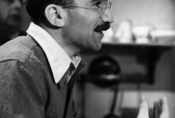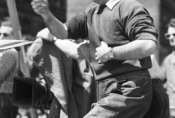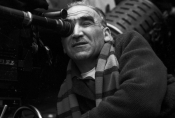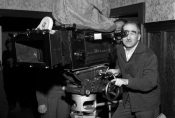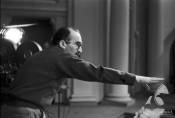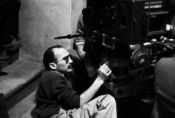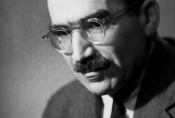Aleksander Ford
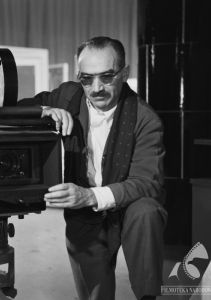
Film director, screenwriter. He was born on November 24, 1908 in Kiev, Ukraine and died on April 4, 1980 in Naples, Florida. While studying art history at the University of Warsaw, he became interested in cinema. Together with Wanda Jakubowska, Eugeniusz Cękalski, Jerzy Toeplitz, Stanisław Wohl and Jerzy Zarzycki, he founded the Association of Art-House Film Lovers “Start” in 1930 in Warsaw, to promote socially involved films of high artistic quality. Five years later, he co-founded the Film Authors Co-operative (Spółdzielnia Autorów Filmowych, SAF). As a director, he made his debut with short documentary films – Nad ranem/At Dawn (1929), Tętno polskiego Manchesteru/The Pulse of the Polish Manchester (1930), Narodziny i życie gazety/Birth and Life of a Newspaper (1930); his films were characterised by impressive poetic form and socially involved content.
In 1930, he made his first feature film – Mascotte (1930). His next film, Legion ulicy/ Legion of the Streets (1932), a neo-realistic tale of the life of young newsboys, was very well received (award of the readers of "Kino" magazine for the best film of the year). In Palestine, he directed Sabra (1933), and in Warsaw – together with Jan-Nowina Przybylski – Przebudzenie/The Awakening (1934), also known as Miłość maturzystki/Love of a School Girl. It was only in films such as Droga młodych/Children Must Laugh (1936), a story about the young patients of an unconventional sanatorium in Miedzeszyn or the melodrama Ludzie Wisły/The People of the Vistula River (1937), co-directed with Jerzy Zarzycki, that his talent truly shone.
During World War II he was in the Soviet Union, where he made the documentaries (Przysięgamy Ziemi Polskiej/We Swear To the Land of Poland – 1943), and training films for soldiers. Along with Jerzy Bossak, in 1943 he organised a film unit called Czołówka Filmowa Ludowego Wojska Polskiego (or simply Czołówka, meaning ‘spearhead’ or ‘opening credits’) with the 1st Division of the Polish Army, which later became the Film Production Company of the Polish Army – with Ford as the director. In 1944, he made Majdanek, cmentarzysko Europy/Majdanek, Cemetery of Europe, the first documentary about the Nazi concentration camp. In the years 1945–1947, he was the first director of the “Polish Film” company. In the years 1948-1949 and 1955-1968, he was the artistic director of two film studios, "Block" and "Studio", respectively. In 1948, he directed Ulica Graniczna/Border Street, a dramatic depiction of the tragedy of the Jewish population in Nazi-occupied Warsaw told through the eyes of the residents of one building (Gold Medal at the Venice Film Festival). Three years later, he made Młodość Chopina/Youth of Chopin (award at Karlovy Vary), an interesting drama biopic made according to the socialist realist formula; in 1953 he completed Piątka z ulicy Barskiej/Five from Barska Street (award at Cannes), based on the popular novel by Kazimierz Koźniewski, a shy precursor of the Polish Film School which was about to reign over Polish cinema thanks to Ford’s younger colleagues – Andrzej Wajda, Andrzej Munk and Jerzy Kawalerowicz.
His spectacular film adaptation of Sienkiewicz’s novel Krzyżacy/The Knights of the Teutonic Order (1960, Golden Duck award) became the biggest hit in the history of Poland, while his next film – an adaptation of the play by Leon Kruczkowski Pierwszy dzień wolności/The First Day of Freedom (1964, Golden Duck award, Warsaw Mermaid) was his farewell to Polish cinema. In 1969, Ford emigrated and left Poland for West Germany, Denmark and ultimately the United States. In 1971, he made Pierwszy krąg/The First Circle, based on the famous novel by Alexander Solzhenitsyn, starring Elżbieta Czyżewska. In 1974, he completed Jest pan wolny, doktorze Korczak/You Are Free, Doctor Korczak, with cinematography by Jerzy Lipman and set design by Anatol Radzinowicz. Six years later, Ford committed suicide.
Jerzy Armata
